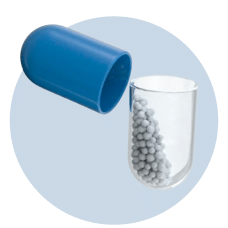Pedi AG Drop
Your child’s medicine at a glance
You can give Pedi AG Drop to your child with food. Pedi AG Drop dose depends on the severity of the infection, its type, and your child’s body weight and age. So, stick to the dose, time, and way prescribed. Do not double-dose if it's time for the next dose.
Common side effects of this medicine include vomiting, diarrhea, and nausea. These side effects should diminish on their own. But, in case they persist or start bothering your child, consult the doctor. They may be able to help prevent or reduce the side effects.
Share your child’s entire medical history with the doctor, including any previous episodes of allergy, heart problems, blood disorders, birth defects, airway obstruction, lung anomalies, gastrointestinal problems, skin disorders, liver impairment, and kidney malfunction. This information will assist the doctor in making dose alterations and planning your child’s overall treatment.
Uses of Pedi AG Drop in children
Benefits of Pedi AG Drop for your child
In Treatment of Bacterial infections
Side effects of Pedi AG Drop in children
Common side effects of Pedi AG
- Vomiting
- Nausea
- Diarrhea
How can I give Pedi AG Drop to my child?
How Pedi AG Drop works
Safety advice
Consult with your child’s doctor before giving Pedi AG Drop to your child in case of a severe form of liver disease.
What if I forget to give Pedi AG Drop to my child?
All substitutes
Quick tips
- Your child must complete the entire course. Stopping too soon may cause the bacteria to multiply again, become resistant, or cause another infection.
- Your child may have a bitter taste in the mouth after the intake of Pedi AG Drop. Eating citrus fruit or sipping plenty of water or fruit juice may help.
- Encourage your child to drink plenty of water in case diarrhea develops as a side effect.
- Never give Pedi AG Drop until and unless prescribed by the doctor. You must also never share your child’s medicine with anyone else, even if they show similar symptoms.
- Never save medicine for future illnesses. It cannot be said whether the same medicine will work on future infections.
- Check “expiry” before giving Pedi AG Drop to your child. Immediately discard all the expired medicines.
- Stop Pedi AG Drop immediately if your child develops an itchy rash, facial swelling, or breathing difficulty. Report to the doctor without any delay.
Fact Box
Patient concerns
FAQs
Can other medicines be given at the same time as Pedi AG Drop?
Can I get my child vaccinated while on treatment with Pedi AG Drop?
Which lab tests may my child undergo while taking Pedi AG Drop on a long-term basis?
Can I give a higher dose than the recommended dose of Pedi AG Drop to my child?
Can I stop giving Pedi AG Drop to my child when the symptoms are relieved?
Can the use of Pedi AG Drop cause diarrhea?
The mucus coming out of my child’s nose is yellow-green. Is it a sign of a bacterial infection?
Is there any sign that shows that my child needs immediate medical attention?
Disclaimer:
Tata 1mg's sole intention is to ensure that its consumers get information that is expert-reviewed, accurate and trustworthy. However, the information contained herein should NOT be used as a substitute for the advice of a qualified physician. The information provided here is for informational purposes only. This may not cover everything about particular health conditions, lab tests, medicines, all possible side effects, drug interactions, warnings, alerts, etc. Please consult your doctor and discuss all your queries related to any disease or medicine. We intend to support, not replace, the doctor-patient relationship.Marketer details
The list of available options shown with the same composition has been prepared upon the advice of registered medical practitioners, pharmacists affiliated with TATA 1MG. TATA 1MG does not promote any pharmaceutical product of any particular company, and all recommendations are based on the medical opinion, advisories from specialist medical and pharmaceutical professionals.
Lab tests offered by us










